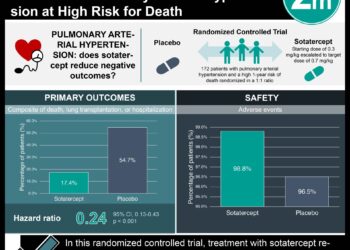The Symplicity HTN-2 trial: Renal denervation in treatment-resistant hypertension [Classics Series]
Image: PD
1. Renal denervation significantly reduces blood pressure in patients suffering from treatment-resistant hypertension
2. Renal denervation was not associated with a significantly higher rate adverse events in comparison to control
Original Date of Publication: December 4, 2010
Study Rundown: Approximately half of hypertensive patients do not experience a reduction in blood pressure despite treatment with pharmaceutical agents and/or lifestyle changes. Efferent sympathetic outflow from kidneys can stimulate renin release and increased tubular sodium reabsorption, thereby increasing blood pressure. Afferent sympathetic outflow from kidneys can influence central sympathetic signals and contribute to neurogenic hypertension. Previous non-randomized trials suggest that renal denervation can successfully ameliorate treatment-refractory hypertension. The Symplicity HTN-2 trial was the first study to randomize patients with treatment-resistant hypertension (i.e., persistent hypertension despite compliance with three or more antihypertensive drugs) to receive renal denervation or not. Results showed that renal denervation can significantly lower blood pressure in these treatment-refractory patients. Treatment with renal denervation was not linked with significantly higher rates of adverse events. There was no major injury to the renal arteries or evidence of worsening renal function associated with the denervation procedure.
Limitations of the study include the low percentage of patients (17%) in both experimental groups that were reported to having used an aldosterone antagonist prior to the study. This raises the concern that the participants’ hypertension may not have been resistant to all available effective drug therapies. Additionally, study participants were only monitored for 6 months, thus the long-term effects of renal denervation were not assessed. It should be noted that more recent studies have shown similar results extended to 24 months.
In summary, the results of the Symplicity HTN-2 trial suggest that catheter-based renal denervation can be safely and effectively used to reduce blood pressure in treatment-refractory hypertensive patients.
Please click to read study in The Lancet
In-Depth [randomized, controlled study]: Published in 2010 in The Lancet, the Symplicity HTN-2 trial was a randomized, controlled trial involving 106 participants from Europe, Australia, and New Zealand. Eligible patients were between the ages of 18 and 85 with a systolic blood pressure (BP) of at least 160 mmHg, despite compliance with at least three hypertensive drugs. Exclusion criteria included a GFR of less than 45 mL/min/1.73 m2, type 1 diabetes mellitus, valvular heart disease, and pregnancy. Renal denervation was performed using the Symplicity catheter to apply radiofrequency treatments along both renal arteries. Changes in the baseline doses of anti-hypertensive drugs were not permitted during the trial. Patients’ BP was measured at 1, 3, and 6 months using office-based and home-based blood pressure machines. Adverse effects were assessed by measuring serum creatinine concentration, cystatin C concentration, and urine albumin-to-creatinine ratio. Kidneys in the denervation group were also imaged by ultrasound. Results based on office-based BP measurements showed that renal denervation resulted in a significant BP decrease of 32/12 mmHg (p<0.0001), while the control group experienced no significant change. At 6 months, office-based BP of patients in the denervation group was significantly lower than the control group (between-group difference of 33/11 mmHg, p<0.0001). Home-based BP was also significantly lower in the denervation group (between-group difference of 22/12 mmHg, p<0.001). There was no difference in estimated GFR, serum creatinine, and cystatin C levels between the two groups.
By Evan Chen and Andrew Cheung, M.D.
©2013 2minutemedicine.com. All rights reserved. No works may be reproduced without expressed written consent from 2minutemedicine.com. Disclaimer: We present factual information directly from peer reviewed medical journals. No post should be construed as medical advice and is not intended as such by the authors, editors, staff or by 2minutemedicine.com. PLEASE SEE A HEALTHCARE PROVIDER IN YOUR AREA IF YOU SEEK MEDICAL ADVICE OF ANY SORT.





